We had another unexpected shock this morning: When Penny went to take Miss Piggy out -she was very lethargic, and a bit wobbly on her feet. Because Fatima thought Miss Piggy might have a fever -and that Butlig might also develop one as a result of the operation -she sent Penny to buy some Paracetamol suppositories.
Suddenly Fatima heard some strange noises from Miss Piggy and when she went to look she was lying down with her tongue hanging out. A short while later she was dead.
This presented us with two questions:
1. Many of our backyard farming neighbours have lost animals after they have been injected by professional vets or animal feed technicians. As a result, they are very suspicious of are very suspicious of outside help for their animals.
So what was the cause of death -and was it caused by the anti-parasite drug Ivermectin (erroneously) administered via intramuscular injection the day before?
Or are out of date (and possibly fake) drugs being used?
2. Another local reason for refusing mainstream veterinary help is the fact that sick animals are usually slaughtered before death so they can be eaten and the investment in them is not wasted.
Because sick animals are eaten, there are no local government provisions for disposing of large animal cadavers. However, Miss Piggy had been given medicine just before her death and therefore could not be consumed.
So how should we dispose of the body?
And so we made two decisions:
1. To have the vet perform a necropsy to try and determine the cause of death.
2. To bury Miss Piggy in the garden.
Digging the grave
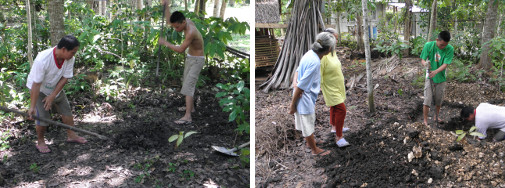
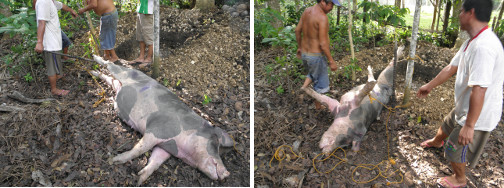
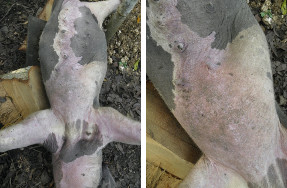

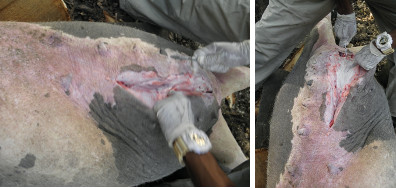


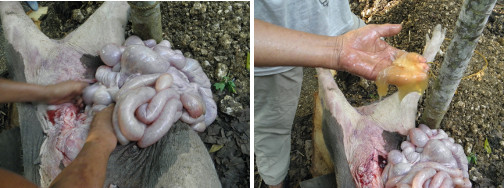






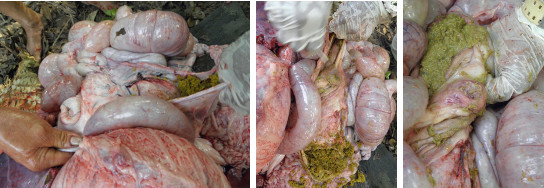






-------------------------------------------------------Conclusion:
Miss Piggy was an undiagnosed sick pig -who probably would have died fairly soon;
However, the anti-mange injection certainly pushed her over the edge.
A Few Personal Remarks:
The events surrounding the death of Miss Piggy signal the existence of an important, complex and subtle problem involving the relationship between "backyard" (subsistence) farmers and the mainstream agricultural (economic and political) system.
The Importance:
Lies in the fact that in rural areas there can be a significant number of local people who are relatively uneducated and untrained -but experienced in backyard farming. For these people backyard farming is an important source of additional food and (essential) pocket money.
This experience leads them to be suspicious of outside (professional) help.
The Complexity:
Lies in the actual and potential relationship with the mainstream agricultural practices, based mainly on large-scale commercial practices in the "developed" world. The education system (and the political-economic system) largely supports the commercial/western model.
There are various visible attempts by (local, provincial and national) government to assist (and "educate") backyard farmers -but one can seriously question the effectiveness of this. One should not assume that the mainstream system knows best. On the other hand, the penetration and influence of modern media (including education) means that many useful traditional practices have been forgotten -so local knowledge may also be of limited value. Perhaps nothing should be taken for granted without testing within the specific environment involved.
For example: The death of backyard animals from various causes is a fact of life. The causes may often remain unknown -because there seems to be no backup research into cause or prevention.
Also, in our area, there seems to be no local government assistance with the disposal of dead animals. This is because dead animals are generally eaten (sometimes being slaughtered just before death -in order to avoid eating dead animals). In turn, this means that standard medical procedures such as injecting anti-biotic are rejected -on practical terms, because the meat of the freshly slaughtered animal is no longer edible.
The Subtlety:
There is a high level of mistrust among backyard farmers regarding the mainstream system. Indeed, the two systems seem to function in parallel with almost no interaction at all.
It appears to be a common experience that the normal injection of medicines which are standard practices in mainstream veterinary practice -often cause mortality in backyard animals.
Obviously, the reasons are usually totally unclear because of the (almost) total lack of interaction between the two systems.
So, mistrust, based on practical experience, leads to a lack of communication which leads to a lack of research into problems and solutions -and the dissemination of any useful practical knowledge that may exist.
This lack of communication, presumably, also leads to a lack of situational experimentation and research focusing on the special needs of backyard farmers.
The Danger:
Those making careers in political and economic systems tend to be very adept at promoting their own self-interest.
Contrary to what many may believe, the solution may not lie in simply "educating the peasant".
In my view, the problem is much deeper -and actually lies in the ignorance of the mainstream system -rather than the ignorance of the backyard farmer.
Indeed, without wishing to romanticize, the backyard farmer may have (but also may not have) some wisdom which may be useful to the mainstream system. One does not know until one looks carefully.
However, one should not underestimate the dangers of the mainstream taking over the backyard farm problem and exploiting it for its own ends. Ultimately, this would be counter-productive -and possibly even self-destructive. Conceptual diversity may yet prove to be as important as biological diversity is now assumed to be.
The Solution?
It seems that backyard conditions may create a different kind of animal (somewhere between a wild and domesticated) which may react differently to animals bred and raised within a more factory farming type of environment.
There is certainly room, and probably a need, for informed research into the special needs of backyard farmers -and the efficacy of their practices.
i. The main function of backyard animals is to provide extra food (particularly at fiesta time) and perhaps a little cash (in times of need) so the refusal to use mainstream medication because it makes the animal unfit seems a very rational and sensible choice.
Veterinary approaches should therefore emphasize natural methods (as opposed to commercial pharmaceutics) -so that prevention and cure are consistent with both the economic situation of the farmer and their need to consume the product.
ii. The mistrust of the backyard farmer for the mainstream system seems justified by the practical results. One might also observe that the problems that the mainstream system has are often the result of mainstream practices -that are therefore totally irrelevant to backyard farming conditions.
While the mainstream system might find positive lessons to be learned in backyard farming -the opposite would not seem to be true.... There is perhaps little that the mainstream system has to offer the backyard farmer.
Backyard farming needs its own set of paradigms -which should not be imposed on it from outside
iii. Any assistance given in the development of backyard farming should be given voluntarily, because those giving assistance are interested in understanding the situation.
Although individuals may benefit from institutionalized backup -any help given should be on a personal basis -and not seen as part of a normal career strategy.
The institutionalization of backyard farming will destroy the independence of the farmer -which is their most important cultural attribute.
iv. Perhaps the importance and role of the backyard farmer should also be seen in a wider "ecological" context which places them outside a system of thought possibly aimed at their removal as a natural part of "economic development".
If current systems of economic development prove as unsustainable as they are beginning to appear -then the development of alternative economic models (including subsistence systems) may well prove to be essential.
Bureaucracy and Creativity:
There is also a more general systemic problem: Namely the tension between a dynamic, creative thinking, system, that by definition is incompatible with static bureaucracies -and the bureaucratic system that organizations generally consider essential to "manage" such processes.
By definition, creative process move beyond their initial constraints. By definition bureaucracies try to create and maintain the restraints that make these processes "manageable". The two principles are thus entirely opposed to each other.
If bio-diversity is important, in order to provide essential redundant alternatives -should conditions change and new foundations need to be found -then cultural and intellectual diversity is equally important in providing the conceptual redundancies that can also form the basis for new ideas and practices should the existing ones prove unsatisfactory for some reason.
Political and managerial systems must leave room for cultural diversity and creativity. The more effectively management systems control -the more suicidal they probably are.
A Personal Note on "Professionalism"
Basically, the concept of "professionalism" involves a set of minimum standards and practices -which if adhered will absolve the practitioner from accusations of malpractice.
This is an essentially "protectionist" concept.
The concept of "professionalism" should never be interpreted to imply a superior understanding of any problem or situation.
Indeed, the ritual and reproductive nature of "education" and its role in building epistemic communities suggests that "professionalism" may actually be contrary to "understanding".